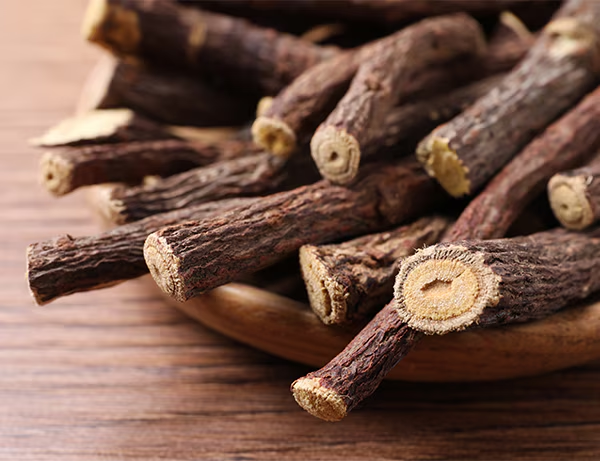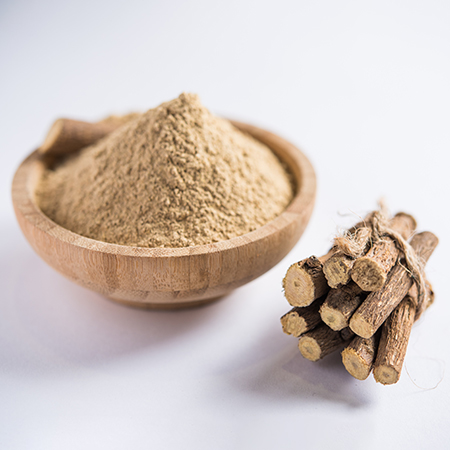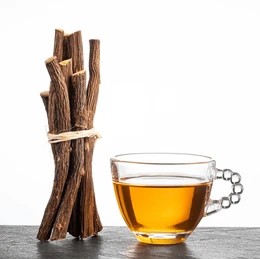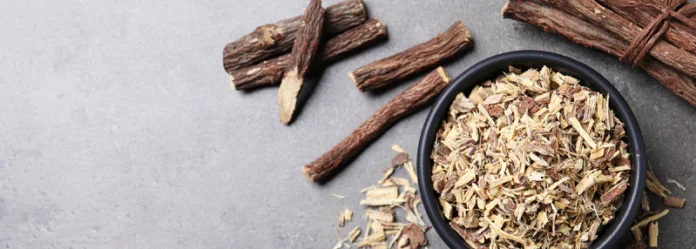INTRODUCTION:
Liquorice, also spelled licorice, is a perennial herbaceous plant scientifically known as Glycyrrhiza glabra. It belongs to the Fabaceae (legume) family and is native to parts of southern Europe, Asia, and the Mediterranean region. The plant is best known for its sweet-tasting root, which has been used for centuries in traditional medicine, flavoring, and confectionery.
English: Liquorice / Licorice

Hindi: मुलेठी (Mulethi)
Sanskrit: यष्टिमधु (Yashtimadhu)
Arabic: عرق السوس (‘araq al-soos)
Chinese (Mandarin): 甘草 (Gān cǎo)
Urdu: ملٹھی (Mulethi)
Tamil: அத்திமதுரம் (Athimadhuram)
Telugu: యష్టిమధు (Yashtimadhu)
Kannada: ಜೇಷ್ಠಮಧು (Jeshtamadhu)
Malayalam: അടിമധുരം (Atimadhuram)
Bengali: যষ্টিমধু (Jôṣṭimôdhu)
HEALTH BENEFITS

Soothes Sore Throat & Cough
Liquorice has expectorant and soothing properties that help relieve sore throat, dry cough, and bronchitis. It’s often used in herbal teas and lozenges.
Supports Digestive Health
It helps reduce stomach acid and soothes irritation in the digestive tract. Useful in treating ulcers, gastritis, heartburn, and indigestion.
Anti-inflammatory Properties
Glycyrrhizin in liquorice has strong anti-inflammatory effects. It can help reduce swelling and pain in conditions like arthritis and eczema.
Boosts Immunity
Liquorice has antiviral and antimicrobial effects. It supports the immune system in fighting infections, including viral illnesses.
Relieves Stress and Fatigue
It supports adrenal gland function and helps the body cope with stress by regulating cortisol levels.
Promotes Skin Health
Used in creams for skin lightening, reducing redness, treating eczema, acne, and hyperpigmentation due to its anti-inflammatory and antibacterial properties.
Helps in Detoxification
Acts as a natural detoxifier for the liver and helps in maintaining healthy liver function.
Menstrual and Hormonal Balance
In traditional medicine, it is used to ease menstrual cramps and symptoms of menopause due to its mild estrogen-like effects.
HELPS in Weight Management
Some studies suggest it may help reduce body fat by influencing metabolism and reducing inflammation.
Fights Respiratory Infections
Its antimicrobial effects make it helpful against respiratory tract infections like asthma, colds, and bronchitis.
SIDE EFFECTS:

Hypertension and Sodium Retention:
Glycyrrhizin, a compound in licorice root, can cause sodium retention and potassium loss, potentially leading to increased blood pressure. Individuals with hypertension or heart conditions should be cautious with licorice root intake.
Hormonal Imbalance:
Prolonged or excessive consumption of licorice root might interfere with hormonal balance, particularly affecting cortisol levels. This imbalance could result in issues such as edema, fatigue, or irregular menstruation.
Electrolyte Imbalance:
Licorice root’s impact on potassium levels may cause electrolyte imbalances. This imbalance might lead to symptoms like muscle weakness, irregular heart rhythms, or fatigue.
Allergic Reactions:
Some individuals may experience allergic reactions to licorice root when applied topically. This can manifest as skin irritation, redness, or itching, particularly when using mulethi powder for face or skin.
Pregnancy Concerns:
Pregnant women should exercise caution with licorice root consumption due to potential adverse effects on fetal development. It’s advisable to avoid high doses or extended use during pregnancy.
HOW TO USE:
1. For Cough and Sore Throat

Liquorice Tea:
Boil 1 teaspoon of dried liquorice root in 1 cup of water for 5–10 minutes.
Strain and drink 1–2 times a day.
Helps soothe the throat and reduce irritation.
Liquorice Powder + Honey:
Mix ½ teaspoon of liquorice powder with 1 teaspoon of honey.
Take once or twice a day for relief from dry cough and sore throat.
2. For Digestion and Ulcers
Liquorice Powder:
Take ¼–½ teaspoon with warm water before meals.
Helps with acidity, ulcers, and indigestion.
DGL (Deglycyrrhizinated Liquorice) tablets:

These are safer for long-term use (no glycyrrhizin).
Follow dosage on the package; often taken before meals.
3. For Skin Care
Liquorice Face Pack:
Mix liquorice powder with rose water or milk to form a paste.
Apply on face to lighten spots, reduce pigmentation, and soothe irritation.
Leave for 10–15 minutes, then wash off.
Liquorice Oil or Extract:
Found in herbal creams and lotions for eczema, acne, and skin brightening.
4. For Immunity and Detox
Liquorice Tea or Decoction:
Drink regularly for general wellness, immunity boost, and liver health.
5. For Menstrual Cramps and Hormonal Support
Liquorice Root Tea:
Can help relieve menstrual discomfort and support hormonal balance.
Not recommended for long-term use without medical advice.
Precautions
Do not use liquorice for more than 4–6 weeks continuously unless under medical supervision.
Avoid in case of:
High blood pressure
Heart disease
Kidney issuesPregnancy or breastfeeding




